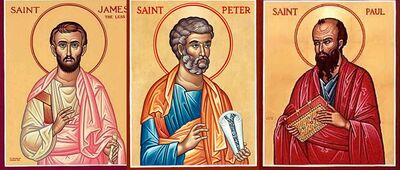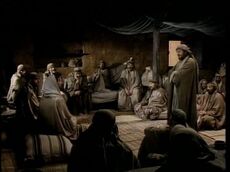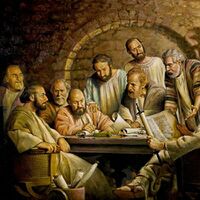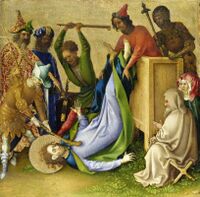Council of Jerusalem
“Excuse my absence, I am busy elsewhere.”

The Council of Jerusalem was a post-crucifixion meeting of the Jesus family, their supporters, disciples and a certain Paul (ex-Saul) of Tarsus to work out what to do with the rest of their lives. The simple question was: Did Jesus intend to reform Judaism and make it into a Messiah cult? or was the message about turning the other cheek, washing dirty feet and dying on the cross a broader message for everyone including non-Jews??
Is He coming back?[edit]
When Jesus officially died and returned for a brief 40 day encore, His rag-bag collection of apostles, followers and family friends expected that their messiah would come back in a matter of days or weeks. Jesus left no written instructions or directions about what they were supposed to do. In fact, the Son of God never put anything in writing. His acolytes strained to remember conversations they had with Him, His anecdotes, jokes and anything else people could recall.
At the time, it seemed immaterial: Jesus would come back to Earth and lead the righteous to victory against their enemies. The only thing agreed was that Jesus's brother James the Just would lead the outfit for now.[1] This appeared to contradict Jesus's talk about Simon Peter being 'The Rock', which suggests he was predicting a career of the fisherman from Galilee as a wrestler in Spandex. Perhaps Jesus had an off-day. Simon Peter was magnanimous when James the Just became the Jesus cult leader for now.
Jews for Jesus[edit]

Having a Son of God in the family didn't pay the bills. However, Jesus, like his adopted father Joseph, was a do-it-yourself genius in woodworking. The brotherhood plied the same trade. James, when he wasn't working on fitted kitchens, developed a reputation as a 'wise man', rather like a rabbi. Under his influence, the self-described 'Nazarenes' kept everything Kosher. To become a Christian, you had to start as a Jew. James may have also been a prude, as he quickly wrote out of the story Jesus's bit-on-the-side, Mary Magdelene. One legend (Hello, Dan Brown?) says she left Palestine with a holy bun in the oven and ended up in Southern Gaul around Marseille. This would make her (and Jesus) the ancestors of Clovis the Frank and his Merovingian dynasty.
The Nazarenes (or Jewish Christians) would have retained tight control of their cult, but for the arrival of Paul of Tarsus. A harsh persecutor of Christians, Saul (as he was then) claimed Jesus had advised him directly to stop being a pain in the arse. Saul took this as a prophetic warning. He cut up his credit cards in his existing name and changed his name to Paul. He would in effect become the first real Christian and would preach to gentiles and Jews alike that Jesus was for everyone.
What Would Jesus Do?[edit]
James got word that Paul was promoting Jesus as everyone's saviour (if you accepted His message). Paul was also saying that Jesus had null-and-voided many Old Testament rules, including dietary restrictions and the rules against wearing Lycra and nylon shorts. Above all, he claimed men didn't need to undergo Genital Mutilation to join the Jews.
By now, rival preachers from the 'Purist' Jewish-Christians and the Pauline gang were looking for recruits.[2] If only Jesus could come back and give a divine sign on the matter! but He kept His heavenly powder dry. During this time, Herod Agrippa reassembled most of the territories in Palestine that his grandfather Herod the Great had held. Herod Agrippa viewed a messiah as a military leader and attacked the Christians in Jerusalem. Told that the sect was led by James, Agrippa's police picked up the wrong Jimmy (brother of John the Evangelist) and had him executed.
This may have , which wasn't held until around 50 AD. By then, Herod Agrippa was dead. His son Herod Agrippa II was something of a bum and not interested in theology.
Cut, Food and Uncut[edit]
Calling a 'council' may have been a stretch, as Christians of any description numbered under a thousand. What reporting we have comes either via the Panglossian Acts of the Holy Apostles (everyone agreed with everyone else) or Paul's letters, which give St. Peter a quiver full of arrows for apparently backsliding again over shunning the Gentile Christians and eating at the Jews' table.
James, Paul and Peter set out their theological points as follows:
| James | Paul | Peter |
|---|---|---|
|
|
|
James the Just insisted his brother's messages, stories and tall tales were for 'Jews Only'. Non-Jews would gain a status if they followed all the other messages contained in the Bible. Paul insisted this was wrong whilst St Peter tried to mediate. For his part, Paul was adamant that Christians need not follow any of the dafter rulers who made Jews so prone to introspection and psychiatry. Circumcised or not, God still loved you.
Paul followed his argument by insisting that all food was good. Jesus had said so. If you fancied a bacon sandwich, you weren't going to hell. Whether Paul munched on pork scratchings during the debates is possible but even this generally hot-tempered fanatic knew where to draw a line. At least sometimes.
Split decision[edit]
To avoid any more unleavened bread roll throwing, James declared that anyone preaching the Word would have to indicate if they were 'With Jimmy' or 'With Paul' — but not both, and not just tell various audiences what they wanted to hear. Peter went along with it; Paul less so, though he realised he was in a tiny minority (for now). James took Paul to the Temple to confirm their agreement.
Paul quickly reneged on the compromise, hoping to gain enough converts to overwhelm the James Gang and, in turn, make Jesus's message to appear to be more aligned with Paul and less so with James. He would eventually succeed.
Different paths to the same destination[edit]
Paul stayed away from James & Co. for years, until James got a new message that the wayward Paul had broken his promises and recalling him to Jerusalem. Reluctantly, Paul agreed. The meeting didn't go well. James again insisted that they visit the temple to confirm their new agreement. The New Testament says Jews tried to kill Paul for his betrayal of Judiasm, but more likely, it was extreme Nazarenes who objected. Paul survived and left Palestine for good. James died at the hands of a mob whipped up by Jewish leaders who had long objected to James and his cult. For one so dedicated to the Temple, James died there in 62 AD.
Neither Paul or Peter outlived James by very much. Both were killed in around 64 AD by emperor Nero for being 'arsonists and Christians'. There were no further attempts to bridge the gap between the Jewish-Christians/Nazarenes and Gentile-Christians/Paulines. They were in effect two religions.
Aftermath[edit]
Shortly before the great rebellion in Palestine that would lead to the destruction of the Temple, surviving members of the Jesus clan left the city for centuries and went back to Galilee, where they reportedly turned into bats. These Jewish Christians maintained that Jesus was human and his mother Mary was no virgin. After all, they had grown up with the lad. Other Christians took this as heresy. Whilst both brands of Christianity were under attack from the Romans, this didn't matter until emperor Constantine the Great offically tolerated (Pauline) Christianity. When these Christians had their first major council to discuss theology and pull each other's beards at the First Council of Nicaea, the Jewish Christians were not invited. They were seen as the heretics with their fixation on a Jewish Jesus.
By now, the Jewish Christians had been both denied access to official Judiasm on the simple grounds that Jesus wasn't the Messiah, and denied communion with other Christians for being too Jewish. At the end of the 4th century, the Nazarenes were as endangered as Arians and Gnostics. When emperor Theodosius the Great banned pagan religion in the Roman Empire, all non-Trinitarian Christians were included. The Jewish Christians had disappeared sometime by the mid 450s. (Or had turned into bats.[3])
The history of Christianity is replete with councils. They try to reconcile opposed groups and nearly always fail, leading instead to Christian persecution and Christian murder.
References[edit]
| Preceded by: Jesus |
Christian Councils 50 A.D. |
Succeeded by: First Council of Nicaea |



